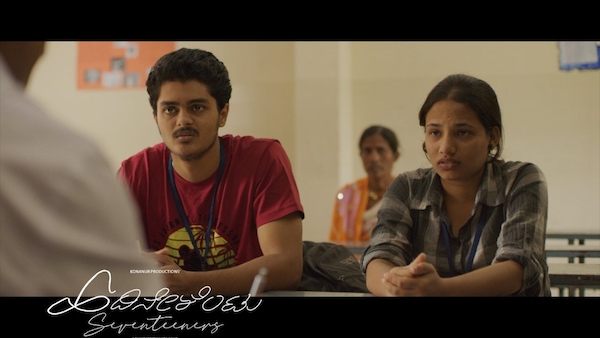Hadinelentu, the Kannada movie you must not miss in 2024
Kannada movie Hadinelentu (17/18) Part 1 is an important film dealing with the critical challenges facing today's teenagers.

Last Updated: 09.25 AM, Feb 01, 2024
You may not have heard about Kannada filmmaker Prithvi Konanur if your knowledge of Kannada cinema begins with KGF and ends with Kantara. He's one of the independent voices in contemporary Indian cinema, narrating a myriad of human stories in the most unassuming fashion.
Prithvi's latest movie Hadinelentu (17/18) Part 1 is an important film dealing with the critical challenges facing today's teenagers. Adolescence is a confusing and tumultuous period due to a combination of physical, psychological, and social changes in everyone's life. Even individuals nurtured in the most supporting environment may not come out unscathed from this crucial period in human development. One can only imagine the scars incurred, both physical and psychological, by those who don't find a conducive and safe environment to make sense of all the changes happening within and around them.
As challenging as the teenage years are, the advent of smartphones, social media and cheap internet services add an extra layer of challenges. While young people fail to grasp the detrimental side effects of mindlessly engaging in virtual activities, parents also seem to have no clue as to how to regulate the online exposure of their impressionable children.
Spoilers ahead, proceed with caution!
The growing-up pains
Hadinelentu begins with Deepa and Hari evading the watchful eyes of their college staff and sneaking into an empty classroom to get intimate. Instead of being in the moment, the first thing that Deepa does is take her phone out and film Hari as he begins to undress. And then Hari films Deepa as she undresses herself. Why would they do that? It's simple: peer pressure. "This is not the first time. It has happened many times in the college," argues Deepa, when her intimate video finds its way to the internet.
Somehow Deepa believes that it's hip to film intimate moments with the lover. And Hari tries to be a college stud by showing his friends his private moments with Deepa. "Put it on the internet. If it goes viral, you will get invited to the Bigg Boss," advises one of Hari's friends. And Hari seriously contemplates the advice.
Cut to the next scene, Hari is standing in the principal's office learning that his video has been discovered on an adult site. And things instantly get bad — not for Hari; just for Deepa.
Deepa has multiple things going against her. To begin with, society is extremely prejudiced against girls and she also comes from a Dalit community. Most of her troubles stem from man-made constructs such as caste bias, patriarchy, discrimination, marginalization and economic inequality —less so from the leaked video itself.
When individuals like Hari mess up, they often receive multiple opportunities to move ahead in life. But, when a girl like Deepa makes a mistake, her life comes to a screeching halt and all the opportunities that promise her a better life go straight out the window.
Following the video leak, Hari is presented with various options. He can seamlessly continue his studies in college as if nothing happened. If college becomes too embarrassing, he can opt for private tuition. Alternatively, he could go to Vancouver and resume his studies. In contrast, Deepa has no choice but to work with her mother, who prepares mid-day meals at government schools. The college shows no willingness to extend any kindness or forgiveness to Deepa, while Hari is let off the hook.
ALSO READ: Hadinelentu movie review: Two teenagers, a viral sex video and a classy portrayal of the aftermath
Is it because the college staff is casteist? "No, we have not taken this decision based on caste," argues the principal, when the PT teacher, a Muslim man from the OBC community points out the caste variables in the college's decision. But, you can see how the social and economic inequalities influenced the different outcomes in the cases of Deepa and Hari.
Is punishment the solution to all problems?
As if the odds are not already stacked against Deepa, in the course of the investigation, the college unearths her birth certificate. She is not 17 as everyone thought. But, she is actually 18. While this revelation may not seem earth-shattering, for Deepa, it marks the difference between a friendly counselling session in the safety of her classroom and potentially serious time in a high-security prison.
The truth about Deepa's age hasn't changed the facts of the case or the unfair treatment she faces every day in her life. Or the fact that she is an impressionable girl trying to behave like a teenager. But, by law, she is an adult and needs to be dealt with the strict provisions of the Indian penal code.
Hadinelentu opens up a can of worms revealing the weak spots of the criminal justice system. As the narrative unfolds, one can't help but wonder how Deepa could have been saved from these life-altering challenges if those in power had shown her some kindness in very the beginning.
The experience of watching Hadinelentu is equivalent to peeping into a neighbour's house, and witnessing their lives as they unravel in the least dramatic ways. When life begins to spiral out of control, in reality, there won't be time for melancholy and melodrama. It's all about survival and doing everything that's within our limited powers to protect what we have.
Prithvi is known for casting non-professional actors in his films. And this practice produces the most original reactions that we will ever see in movies. The entire cast, including Sherlyn Bhosale, Neeraj Matthew, Rekha Kudligi, Bhavani Prakash and Ravi Hebballi have all delivered excellent and the most realistic performances that will leave an impression on your mind.

